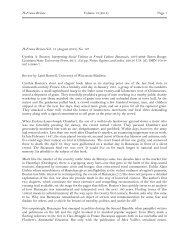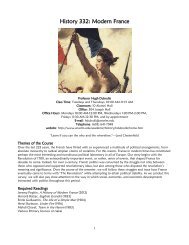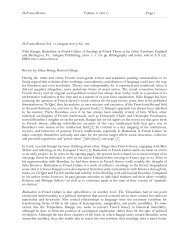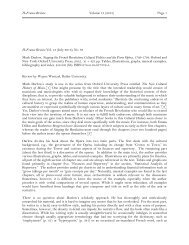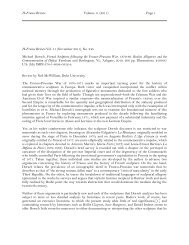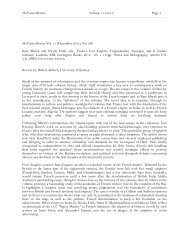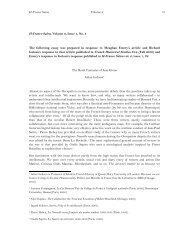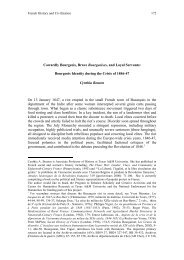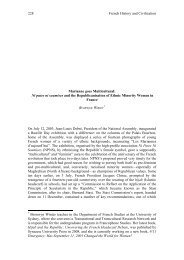Review - H-France
Review - H-France
Review - H-France
Create successful ePaper yourself
Turn your PDF publications into a flip-book with our unique Google optimized e-Paper software.
H-<strong>France</strong> <strong>Review</strong> Volume 11 (2011) Page 2<br />
In the Good Wife’s Guide, Greco and Rose convey in clear, fluid prose the distinct registers of a<br />
diverse work that ranges from pious exhortations and Biblical exempla to fabliau-like tales,<br />
veterinary remedies, and flavorful recipes and whose narrative voice alternately expresses<br />
religious reverence, patriarchal authority, masculine anxiety, husbandly solicitude, and a<br />
sometimes obsessive attention to domestic details. Selective spot-checking suggests that this<br />
translation is highly reliable. My only significant quibble is not with the text itself, but with the<br />
authors’ misleading explanation in their introduction of the Middle French title, Le Ménagier de<br />
Paris. They claim that this “means [sic] The Parisian Household Book” (p. 2). Yet they<br />
accurately translate the term “nouvel mesnagier” in the Chemin de Pauvreté et de Richesse as<br />
«newly made head of household » (p. 185). In both cases, “ménagier” refers to a person, not to a<br />
book.[6] “The Parisian Householder” would be a more accurate literal translation of Le<br />
Ménagier de Paris. Eileen Power’s somewhat antiquated “Goodman of Paris” is not far from the<br />
mark. Fortunately, the title chosen for the authors’ own translation, The Good Wife’s Guide…A<br />
Medieval Household Book, neatly describes both the function of the book and its intended<br />
audience.<br />
The authors have wisely eschewed archaic language and aimed for clarity and simplicity in<br />
modern English. I found myself wishing that they had retained the term “Distinction” to<br />
describe the book’s major divisions and that they had kept French nomenclature Griseldis and<br />
Gautier for Griselda and Walter, as they do for most of the Ménagier’s named figures, so that<br />
these characters might be more easily distinguished from those in the Clerk’s Tale and in<br />
Boccaccio. But these are minor matters of taste. Greco and Rose deserve our thanks for making<br />
this important late medieval tract available in its entirety to students who do not read modern<br />
French. (Those who read French should use Ueltschi’s translation for all but the Chemin, since<br />
her version is closer in style and lexicon to the original Middle French, reproduced on the<br />
facing page.) Thanks are due also to Cornell University Press for making the book available in<br />
a handsome, reasonably-priced paperback edition so that it may find its rightful place as<br />
assigned or recommended reading in courses on Medieval History, Medieval European<br />
Literature, and Women’s Studies.<br />
The Greco/ Rose translation is accompanied by a lengthy introduction, a glossary of culinary<br />
terms, and a bibliography of editions, dictionaries, and critical works consulted. The<br />
Introduction provides a thoughtful discussion of the narrator’s literary enterprise and domestic<br />
agenda, offers an overview of conduct books and literary sources, and concludes with a lengthy<br />
comparative analysis of the Ménagier’s Griselda exemplum and Chaucer’s Clerk’s Tale. The<br />
extent of this last section, which comprises one third of the entire introduction, suggests that<br />
the authors address their translation primarily to students of medieval English literature.<br />
Although these pages contain much that is helpful and stimulating, students unfamiliar with<br />
continental literature might have been better served by a more streamlined presentation that<br />
would have placed the Ménagier more precisely in its French context. Medieval conduct books<br />
might have been more coherently presented in chronological order in “Contexts: Conduct Books<br />
and Household Books” (pp. 18-28), with description of their specific milieu, generic register, and<br />
audience, and with complete bibliographical references for all editions cited.[7] One<br />
understands the desire not to overburden the bibliography of a translation for English-speaking<br />
students with French criticism in French or English. But since some quite specialized studies<br />
are included (among them an inaccessible conference paper given by Greco on the Jehan de<br />
Saintré, a didactic work composed more than half a century after the Ménagier), it is surprising<br />
to find no mention of classic works such as those by Alice Hentsch (on medieval didactic<br />
literature for women),[8] Elie Golenistcheff-Koutouzoff (on the Griselda story in late medieval<br />
<strong>France</strong>),[9] and Diane Bornstein (on medieval courtesy books).[10]<br />
2



